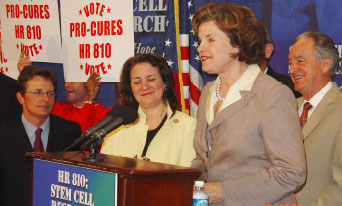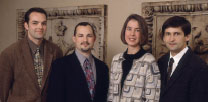 |
|
 |
 |
 |
 |
|
Over the years, the Foundation has supported a broad number of issues. In October 2004, the Board of Directors narrowed the Foundation's focus and three of the following four programs were closed as of the end of June 2005. We continue our engagement in advancing stem cell research, but as a secondary priority.
Advancing Stem Cell Research
The Foundation remains committed to full federal funding for embryonic stem cell research and ensuring that somatic cell nuclear transfer (SCNT, or therapeutic cloning) remains a legal form of medical research in the United States. This research must continue so that scientists can persevere in their search for cures for devastating diseases and conditions such as cancer, heart disease, Parkinson's disease, diabetes, Alzheimer's and spinal cord injury, which affect millions of Americans.
The Kirsch Foundation, as a longtime member of the Coalition for the Advancement of Medical Research (CAMR), continues to support expanding the Bush Administration's embryonic stem cell policy, which currently allows funding research on only 20-plus stem cell lines. CAMR played a significant role in the U.S. House of Representatives' historical May 2005 vote in support of bipartisan legislation to expand federal stem cell policy. In addition, CAMR and its partners stopped legislative assaults to ban SCNT in the Senate and House, and worked to protect SCNT at the state level.

Members of Congress held a press conference in favor of pro-cures legislation, featuring (L to R) actor Michael J. Fox, Representative Diana DeGette, Senator Dianne Feinstein and Senator Tom Harkin. |
|
|
I wanted a perfect ending. Now I've learned, the hard way, that some poems don't rhyme, and some stories don't have a clear beginning, middle and end.”
• Gilda Radner, Actress |
|
 |
|
Campaign Finance Reform
One of the Foundation's very first commitments was in support of campaign finance reform and it manifested itself in a three-year grant of $750,000 to Public Campaign. The need for public financing is still clear: too many elected officials are beholden to special interests and do not represent the needs of all citizens. Over the years, we continued to support Public Campaign and its Action Fund. We also supported initiative efforts in various states and helped to fund battles to keep public financing alive when it was under attack.
During the six years we funded campaign finance reform, we made grants in excess of $1,400,000. Our final grant to the cause, appropriately, was to Public Campaign, the leader in the fight for reform.
|
|
 |
Catalyst For a Cure - Glaucoma
In December 2004, the first phase of the Catalyst for a Cure (CFC) research program, a three-year, collaboratively-funded endeavor to develop a new approach to combating glaucoma, ended. The Kirsch Foundation and our funding partner, the Glaucoma Research Foundation, jointly and equally provided about $1,500,000 in support of this effort. CFC brought four researchers from different backgrounds together, and resulted in the development of a new, exciting theory about the cause of glaucoma.
We are delighted that the Glaucoma Research Foundation, whose work is devoted to finding a cure for glaucoma, is continuing this work at the end of our partnership.
|
|

CFC Researchers: (L to R) Philip Horner, David Calkins, Monica Vetter, Nicholas Marsh-Armstrong.
|
The Threat from Near Earth Objects (NEOs)
Experts estimate that the odds of dying from an asteroid, otherwise called a Near Earth Object (or NEO), colliding with the Earth are 1 in 20,000, about the same as that of dying in a plane crash. While nearly 90% of NEOs larger than one kilometer (with the potential to destroy Earth) have been found, thousands of smaller asteroids remain undetected and have the potential to do significant damage.
The Foundation has long believed that governments worldwide should increase their funding for NEOs identification and tracking, as current funding is limited in comparison to the magnitude of the threat. To this end, we contracted with a Washington, DC, government relations firm to secure augmented funding in the congressional budget for NEOs detection and tracking. We found House and Senate Members willing to champion this cause, but Congress had difficulty passing its budget at the end of 2004, and many critical programs were left unfunded, including our NEOs project.
|
|
 |
|
 |
|
